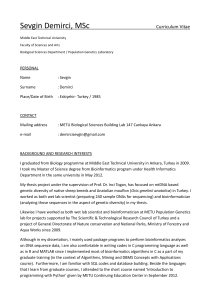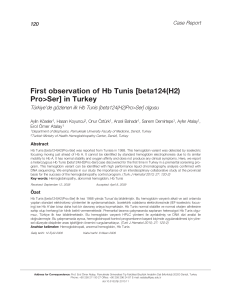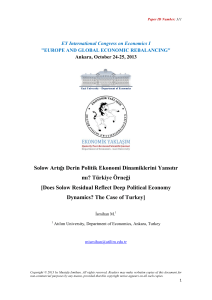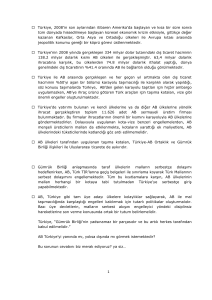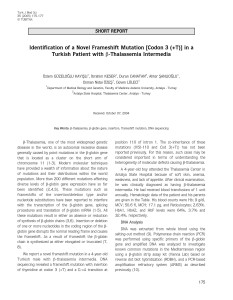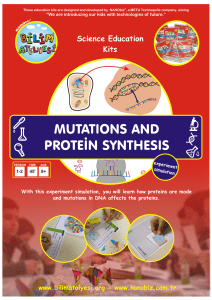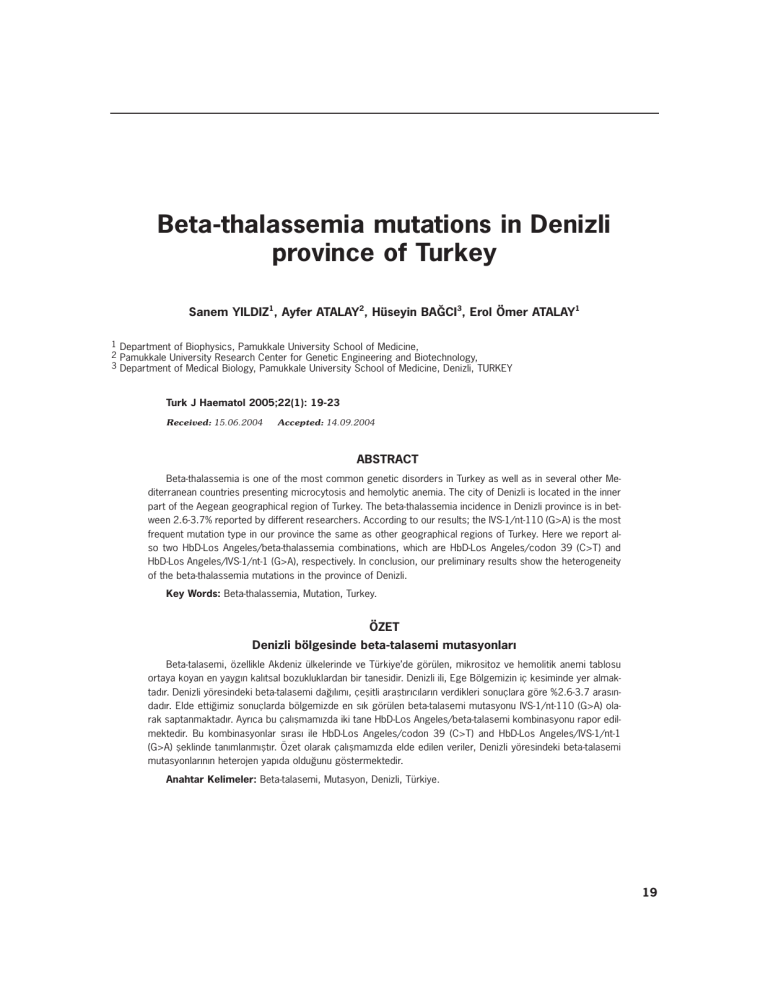
Beta-thalassemia mutations in Denizli
province of Turkey
Sanem YILDIZ1, Ayfer ATALAY2, Hüseyin BA⁄CI3, Erol Ömer ATALAY1
1 Department of Biophysics, Pamukkale University School of Medicine,
2 Pamukkale University Research Center for Genetic Engineering and Biotechnology,
3 Department of Medical Biology, Pamukkale University School of Medicine, Denizli, TURKEY
Turk J Haematol 2005;22(1): 19-23
Received: 15.06.2004
Accepted: 14.09.2004
ABSTRACT
Beta-thalassemia is one of the most common genetic disorders in Turkey as well as in several other Mediterranean countries presenting microcytosis and hemolytic anemia. The city of Denizli is located in the inner
part of the Aegean geographical region of Turkey. The beta-thalassemia incidence in Denizli province is in between 2.6-3.7% reported by different researchers. According to our results; the IVS-1/nt-110 (G>A) is the most
frequent mutation type in our province the same as other geographical regions of Turkey. Here we report also two HbD-Los Angeles/beta-thalassemia combinations, which are HbD-Los Angeles/codon 39 (C>T) and
HbD-Los Angeles/IVS-1/nt-1 (G>A), respectively. In conclusion, our preliminary results show the heterogeneity
of the beta-thalassemia mutations in the province of Denizli.
Key Words: Beta-thalassemia, Mutation, Turkey.
ÖZET
Denizli bölgesinde beta-talasemi mutasyonlar›
Beta-talasemi, özellikle Akdeniz ülkelerinde ve Türkiye’de görülen, mikrositoz ve hemolitik anemi tablosu
ortaya koyan en yayg›n kal›tsal bozukluklardan bir tanesidir. Denizli ili, Ege Bölgemizin iç kesiminde yer almaktad›r. Denizli yöresindeki beta-talasemi da¤›l›m›, çeflitli araflt›r›c›lar›n verdikleri sonuçlara göre %2.6-3.7 aras›ndad›r. Elde etti¤imiz sonuçlarda bölgemizde en s›k görülen beta-talasemi mutasyonu IVS-1/nt-110 (G>A) olarak saptanmaktad›r. Ayr›ca bu çal›flmam›zda iki tane HbD-Los Angeles/beta-talasemi kombinasyonu rapor edilmektedir. Bu kombinasyonlar s›ras› ile HbD-Los Angeles/codon 39 (C>T) and HbD-Los Angeles/IVS-1/nt-1
(G>A) fleklinde tan›mlanm›flt›r. Özet olarak çal›flmam›zda elde edilen veriler, Denizli yöresindeki beta-talasemi
mutasyonlar›n›n heterojen yap›da oldu¤unu göstermektedir.
Anahtar Kelimeler: Beta-talasemi, Mutasyon, Denizli, Türkiye.
19
Y›ld›z S, Atalay A, Ba¤c› H, Atalay EÖ.
INTRODUCTION
Beta-thalassemia is one of the most common genetic disorders in Turkey as well as in
several other Mediterranean countries presenting microsytosis and hemolytic anemia[1-3]. Research on beta-thalassemia and
other hemoglobin disorders in Turkey had
been initiated by Aksoy et al in 1941[4]. In
1971, the prevalence of beta-thalassemia in
Turkey was reported as 2%[1]. There are
many research studies on the prevalance of
beta-thalassemia regarding to the distribution on country scale in Turkey[4-9]. These research studies enlarged under the development of molecular techniques used for either
detection and/or its prenatal diagnosis[10-15].
Denizli is located in inner part of Aegean region of Turkey. The beta-thalassemia incidence in Denizli is in between 2.6-3.7% reported by different researchers[16-18]. Premarital screening is applied in Denizli province
by the Turkish Ministry of Health Thalassemia Laboratory since 1985. Pamukkale University Research Center for Genetic Engineering and Biotechnology (PAMGEN) Molecular Diagnosis Laboratory has been established by the year of 2003 and initiated the molecular diagnosis of beta-thalassemias and
abnormal hemoglobins. The total number of
the individuals who applied for molecular diagnosis to our Center is 260 by the date of
May 2004. Here we report the preliminary
data for beta-thalassemia mutations of these
individuals who are unrelated with each other, observed in Denizli province of Turkey.
MATERIALS and METHODS
The total number of individuals is 260
tested for hemoglobin disorders for the year
of 2004. Some of them were couples at risk
which were informed during premarital screening program at Turkish Ministry of Health,
Denizli Thalassemia Laboratory. Since some
individuals are relatives, their data was excluded for this manuscript. On the other
hand, abnormal hemoglobins except HbDLos
Angeles/beta-thalassemia combinations were also excluded from the data. The number
20
Beta-thalassemia mutations in Denizli province of Turkey
of individuals which are unrelated with each
other is 53. Written informed consent was
obtained from all individuals in the study.
Alkaline and acid hemoglobin electrophoresis was performed with agarose based kits of
Helena Biosciences. DNA was isolated with
standard phenol-chloroform extraction, ethanol precipitation procedure and mutation
analysis for the β-globin gene was done with
β-Globin Strip assay (ViennaLab cat.no. 4120, Austria)[19]. For the molecular detection
of HbD variants at β-globin codon 121, genomic DNA was amplified the primers of
PAM117 (5’-CAA TGT ATC ATG CCT CTT
TGC ACC-3’) and PAM118 (5’-GAG TCA AGG
CTG AGA GAT GCA GGA-3’) and digested
with EcoRI[20]. PCR product is 861 bp in
length and restriction digests examined by
2% agarose gel electrophoresis. In case of
mutation in codon 121, the EcoRI restriction
site on codon 121 is being lost. For normal βglobin gene, two fragments, 552 bp and 309
bp in length are observed after EcoRI digestion of the PCR product. The samples diagnosed as HbD-Los Angeles by EcoRI-SNP analysis were confirmed also with DNA sequencing. DNA sequencing was done by radioactively labelled manual dideoxy termination
procedure. DNA sequencing for HbD-Los Angeles case was done in Çukurova University
Medical Faculty Department of Biochemistry.
RESULTS
Table 1 shows the results of molecular diagnosis for the 55 chromosomes from 53 individuals with beta-thalassemia trait, analyzed with 20 different beta-thalassemia mutations. Approximately ninety five percent of
the chromosomes were identified with these
20 mutations. The most frequent beta-thalassemic mutation was found to be IVS-1/nt110 (G>A). Two individuals were HbD-Los Angeles/beta-thalassemia combinations. Both
of them were HbD-Los Angeles/beta-thalassemia combinations, carrying the mutations
HbD-Los Angeles/codon 39 (C>T) and HbDLos Angeles/IVS-1/nt-1 (G>A), respectively.
Turk J Haematol 2005;22(1):19-23
Beta-thalassemia mutations in Denizli province of Turkey
Table 1. Frequencies of beta-thalassemia mutations in Denizli province of Turkey
Mutation type
No. of chromosomes
IVS-1/nt-110 (G>A)
20
IVS-1/nt-1 (G>A)
9
IVS-1/nt-6 (T>C)
4
IVS-2/nt-745 (C>G)
4
IVS-1/nt-5 (G>C)
1
Codon 8 (-AA)
2
Codon 39 (C>T)
5
-87
2
IVS-2/nt-1 (G>A)
2
-30 (C>G)
NF
Codon 5 (-CT)
NF
Codon 6 (-A)
NF
Codon 8/9 (+G)
1
Codon 22 (7 bp del)
NF
Codon 30 (G>C)
NF
IVS-1/nt-2 (T>A)
NF
IVS-1/nt-116 (T>G)
NF
IVS-1/nt-25 (25 bp del)
NF
Codon 36/37 (-T)
NF
Codon 44 (-C)
NF
HbD-Los Angeles
2
Unknown
3
Total
55
NF: Not found.
The presence of HbD-Los Angeles as carrier
state was confirmed by both with EcoRI SNP
analysis and DNA sequencing.
DISCUSSION
The preliminary results are the first published data from Denizli province of Turkey
concerning the beta-thalassemic mutations.
Table 1 summarizes the data obtained in the
base of mutations and Table 2 summarizes
the comparison of the data related with
Aegean Region studies present in the literature[11,21]. Data is consistent, in some respects, with the national and regional distri-
Turk J Haematol 2005;22(1):19-23
Y›ld›z S, Atalay A, Ba¤c› H, Atalay EÖ.
butions of the beta-thalassemic mutations,
for the incidence of IVS-1/nt-110 (G>A) mutation as the most common mutation type. Here we report for the first time, up to our knowledge, two HbD-Los Angeles/beta-thalassemia
combinations from Denizli province of Turkey.
We would like to emphasize that the presence
of HbD-Los Angeles and other abnormal hemoglobin types is greater than expected according to our unpublished results.
Our data is more closely related with Gülesken et al. Tadmouri et al did not report for
the IVS-1/nt-1 (G>A), codon 39 (C>T) and
–87 mutations for Aegean/Mediterranean
part of Turkey[11,21]. This is probably due to
the relatively small sample size and the large
covering area of Aegean/Mediteranean region. Similar situation appears also with the
publication of Atalay et al[9]. Since Atalay et
al show the mutation data as Western part
of Turkey, including Aegean, Marmara and
inner part of Anatolia, therefore we do not
include these data into the comparison table. In case of the Gülesken et al results, they
did not report IVS-1/nt-5 (G>C) and codon 8
(-AA) mutations. We identified IVS-1/nt-5
(G>C) and codon 8 (-AA) mutations as 1.8%
and 3.6% respectively. On the other hand,
we also report the presence of codon 8/9 (+G)
mutation in Denizli province of Turkey. We
could not identify 5.5% of our thalassemia
trait cases with these 20 Mediterranean type
of mutations. This finding also shows the heterogenousity of the beta-thalassemia mutations in our province.
In conclusion; we report for the first time
the beta-thalassemia mutational data related
with the Denizli province of Turkey. Our data show the complexity of the beta-thalassemia mutations in our area due to the historical aspects and geographical location of Denizli province in Anatolian basin. The research and screening studies on the individual
regions will show much more detailed mutation profiles contributing the knowledge of
national mutation databases leading to the
prenatal diagnostic approaches for the thalassemia control programs in Turkey.
21
Beta-thalassemia mutations in Denizli province of Turkey
Y›ld›z S, Atalay A, Ba¤c› H, Atalay EÖ.
Table 2. Beta-thalassemia mutations in Denizli Province of Turkey in comparison with other publications on
Aegean region
Number of beta-thalassemic chromosomes
Denizli province
Gülesken et al[21]
(Aegean Region)
Tadmouri et al[10]
(A/M* Region)
IVS-1/nt-110 (G>A)
36.4%
44.1%
56.7%
IVS-1/nt-1 (G>A)
16.4%
28.2%
-
IVS-1/nt-6 (T>C)
7.3%
13.3%
13.3%
IVS-2/nt-745 (C>G)
7.3%
9.3%
-
IVS-1/nt-5 (G>C)
1.8%
-
6.7%
Codon 39 (C>T)
9.1%
2.4%
-
-87
3.6%
NF
-
Codon 8 (-AA)
3.6%
-
6.7%
IVS-2/nt-1 (G>A)
3.6%
2.7%
3.3%
-30 (C>G)
NF
-
6.7%
Codon 5 (-CT)
NF
-
3.3%
Codon 6 (-A)
NF
NF
-
1.8%
-
-
Codon 22 (7 bp del)
NF
-
-
Codon 30 (G>C)
NF
-
-
IVS-1/nt-2 (T>A)
NF
-
-
IVS-1/nt-116 (T>G)
NF
-
-
IVS-1/nt-25 (25 bp del)
NF
-
-
Mutation type
Codon 8/9 (+G)
Codon 36/37 (-T)
NF
-
-
Codon 44 (-C)
NF
-
-
HbD-Los Angeles
3.6%
-
-
Unknown
5.5%
-
3.3%
55** (100%)
150** (100%)
30** (100%)
Total
* A/M: Aegean/mediterranean region.
** Total number of chromosomes.
NF: Not found.
REFERENCES
1.
2.
3.
4.
22
Çavdar AO, Arcasoy A. The incidence of ß-thalassemia and abnormal hemoglobins in Turkey. Acta Hematol 1971;45:312-8.
Kazazian HH, Boehm C. Molecular basis and prenatal
diagnosis of β-thalassemia. Blood 1988;72:1107-16.
Cao A, Gossens M, Pirastu M. β-thalassemia mutations in Mediterranean populations. Br J Hematol
1989;71:309-12.
Aksoy M. The history of β-thalassemia in Turkey.
Turk J Pediat 1991;33:195-7.
5.
6.
7.
Akar N, Çavdar AO, Dessi E, Loi A, Pirastu M, Cao
A. Beta thalassaemia mutations in the Turkish population. J Med Genet 1987;24:378-9.
Öner R, Altay Ç, Gürgey A, Aksoy M, Kılınç Y, Stoming TA, Reese AL, Kutlar A, Kutlar F, Huisman
TH. Beta-thalassemia in Turkey. Hemoglobin 1990;
14:1-13.
Aulehla-Scholz C, Basaran S, Agaoglu L, Arcasoy A,
Holzgreve W, Miny P, Ridolfi F, Horst J. Molecular
basis of beta-thalassemia in Turkey: Detection of rare mutations by direct sequencing. Hum Genet
1990;84:195-7.
Turk J Haematol 2005;22(1):19-23
Beta-thalassemia mutations in Denizli province of Turkey
8.
9.
10.
11.
12.
13.
14.
15.
16.
Başak AN, Özçelik H, Özer A, Tolun A, Aksoy M,
Ağaoğlu L, Ridolfi F, Ulukutlu L, Akar N, Gurgey A,
Kırdar B. The molecular basis of beta-thalassemia in
Turkey. Hum Genet 1992;89:315-8.
Atalay EÖ, Çırakoğlu B, Dinçol G, Atalay A, Kılınç
Y, Aytekin H, Yüregir GT, Arpacı A, Bermek E, Aksoy M. Regional distributions of β-thalassemia mutations in Turkey. Int J Hematol 1993;57:207-11.
Tadmouri GO, Garguier N, Demont J, Perrin P, Basak AN. History and origin of beta-thalassemia in
Turkey: sequence haplotype diversity of beta-globin
genes. Hum Biol 2001;73:661-74.
Tadmouri GO, Basak AN. Beta-thalassemia in Turkey: a review of the clinical, epidemiological, molecular, and evolutionary aspects. Hemoglobin 2001;
25:227-39.
Atalay E, Çırakoğlu B, Erdoğan G, Bermek E, Aksoy
M. Prenatal diagnosis of a beta-globin gene IVS
1nt/110 mutation in chorionic villus from a mosaic
triple-X mother with high HbA2. Prenat Diagn
1990;10:343-4.
Tüzmen S, Tadmouri GO, Özer A, Baig SM, Özçelik H, Başaran S, Başak AN. Prenatal diagnosis of
beta-thalassaemia and sickle cell anaemia in Turkey.
Prenat Diagn 1996;16:252-8.
Gürgey A, Beksaç S, Gümrük E, Çakar N, Mesci L,
Altay S, Öner C, Altay Ç. Prenatal diagnosis of hemoglobinopathies in Turkey: Hacettepe experience.
Pediatr Hematol Oncol 1996;13:163-6.
Çürük MA, Kılınç Y, Evruke C, Özgünen FT, Aksoy
K, Yüregir GT. Prenatal diagnosis of HbH disease
caused by a homozygosity for the alpha2 polyA (AATAAA--->AATAAG). Hemoglobin 2001;25: 255-9.
Keskin A, Turk T, Polat A, Koyuncu H, Saracoglu B.
Premarital screening of beta-thalassemia trait in the
province of Denizli, Turkey. Acta Hematol 2000;
104:31-3.
Turk J Haematol 2005;22(1):19-23
Y›ld›z S, Atalay A, Ba¤c› H, Atalay EÖ.
17. Bolaman Z, Enli Y, Köseoğlu M, Koyuncu H, Aslan
D. Prevalance of beta thalassemia trait in Denizli.
Turk J Hematology 2001;18:85-8.
18. Sözmen M, Uysal Z, Yeşil N, Akar N, Arcasoy A.
Denizli’de anormal hemoglobin ve hemoglobin A2
yüksekliği ile karakterize beta talasemi taşıyıcılığı
araştırması. Ankara Tıp Mecmuası 1990;43:959-64.
19. Poncz M, Solowiejczky D, Harpel B, Mory Y,
Schwartz E, Surrey S. Construction of human gene
libraries from small amount of peripheral blood. Hemoglobin 1982;6:27-36.
20. Old JM. Hemoglobinopathies: Community clues to
mutation detection. In: Elles R (ed). Molecular Diagnosis of Genetic Diseases. New Jersey: Humana
Press Inc, 1996:169-83.
21. Gülesken S, Ören H, Vergin C, Sanlı N, Gulen H,
Ucar C, İrken G. Mutational analysis of beta-thalassemia cases from the Aegean region of Turkey using
an allele-specific oligonucleotide hybridization technique. Acta Hematol 2000;104:181-4.
Address for Correspondence:
Erol Ömer ATALAY, MD
Department of Biophysics
Pamukkale University School of Medicine
Denizli, TURKEY
e-mail: [email protected]
23

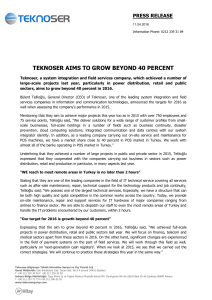
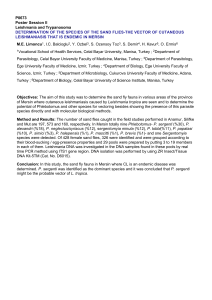
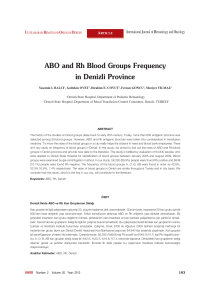
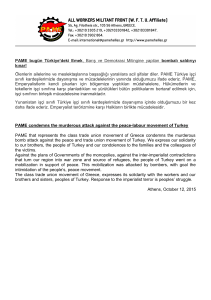
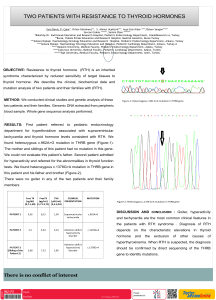
![First observation of Hb D-Ouled Rabah [beta19(B1)Asn>Lys] in the](http://s1.studylibtr.com/store/data/003346881_1-fc6465a17750760535fb52bbef4ddf81-300x300.png)
